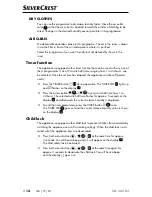
■
10
│
GB
│
IE
│
NI
SLE 265 B3
Before initial use
♦
Place the appliance on a flat, dry and solid surface.
♦
Allow the appliance to remain in the usage position for approx. 30 minutes
so that the coolant can settle.
♦
Check whether the water tank
4
has been correctly inserted.
♦
Insert the plug into a mains power socket.
Electrical connection
CAUTION
►
Before connecting the appliance, compare the specifications for the
required input voltage on the rating plate with the intended voltage source
for operation. This data must agree so that the appliance is not damaged.
►
The power cable must always be easily accessible, so that the appliance
can be quickly removed from the mains in the event of an emergency.
►
Check whether the power cable is undamaged and that it is not routed
over hot surfaces and/or sharp edges, otherwise it will become damaged.
►
Ensure that the power cable is not taut or kinked.
Guidelines for operation
■
If the air in your living spaces is constantly excessively humid, the cause should
be identified and addressed. (Running the dehumidifier continuously for years is
not reasonable.)
■
The optimal ambient temperature for dehumidifying the air is 5°C to 35°C.
Using a dehumidifier at temperatures below 5°C is redundant, as there is little
humidity in the air.
■
During operation, room temperature can increase by between 1°C and 4°C,
depending on the size of the room. This is normal.
Automatic defrosting
To ensure that the appliance does not ice up during sustained operation, it defrosts
automatically. The defrosting function is activated automatically and cannot be
switched on manually. The appliance cannot be switched off during defrosting.
During defrosting, the AUTO DEFROST LED
18
lights up. The lower the ambient
temperature at which the appliance is operated, the earlier or more often the
automatic defrosting is activated. Once the defrosting process is complete, the
appliance resumes operation in the previous selected settings.














































